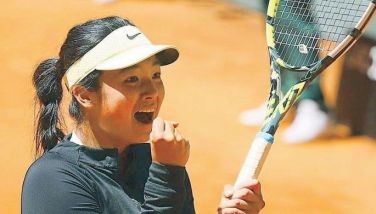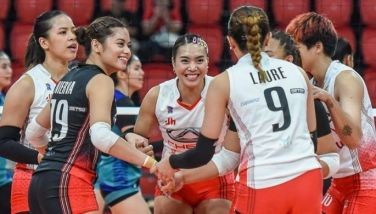Keon: Abolish PSC for new sports body
MANILA, Philippines – In a radical approach to put Philippines sports on the right track, former Gintong Alay project director Michael Keon yesterday batted for the abolition of the PSC to create a new Department of Sports headed by a Cabinet-rank Secretary reporting to the next President with transparency and accountability.
“If we are to create a new climate, the best way to go about it is to overhaul the present system,” said Keon, a former Ilocos Norte governor and UP student athlete. “The PSC has had its day. It has passed its expiry date. Philippine sports needs a new direction. The state of Philippine amateur sports today is disappointing. For the Philippines to place seventh in the Southeast (SEA) Games as we did in Myanmar in 2013 with a subsequent sixth place in Singapore last year, with a bigger delegation, is a testimony to the fact that there is something gravely wrong.”
Keon said the peaks and valleys that are a disturbing trend in the history of the country’s performance in sports are symptomatic of a dysfunctional system. “It goes around in circles,” he said. “The PSC has been in existence during the tenure of five Presidents. As each new President comes into office, a new set of sports officials is appointed. Each new administration implements its own guidelines and plans. Some have been successful and others have not, hence, the rise and fall of Philippine sports. As things stand today, the PSC is too segregated from national governance. There is not enough monitoring of PSC activities and policy.”
With the creation of a Department of Sports, Keon said a more business-like and professional approach is expected with the Secretary submitting periodic reports to the President and the Cabinet in solving problems and needs. “Making presentations to the Cabinet would ensure greater oversight and whatever the Secretary reports will be reflected in the minutes of the Cabinet meetings and covered by the Malacañang Press Corps,” he said. “At the juncture between the abolition of the PSC and the creation of the Department of Sports, the President could convene something similar to a national convention for sports. All stakeholders should come together. I’m referring to the POC comprised of the NSAs, the Committees on Sports in both the Senate and Congress, the Department of Education and the Department of the Interior and Local Government, the Office of the President and the Civil Service Commission.”
Keon said the President should mandate the stakeholders to craft a new blueprint for Philippine sports. “The best and most appropriate plans, policies and programs for Philippine sports should be enshrined in that blueprint,” he said. “It becomes part of the charter and Constitution creating the Department of Sports and made into law. If each succeeding Administration follows this blueprint, if there is continuity in policy and no deviation, then and only then might we succeed in implementing a long-term solution for Philippine sports.”
Keon also branded the recruitment of Fil-foreigners to upgrade the standards of the country’s performance in international sports as a cover-up for the absence of a real and meaningful long-term development program.
“The success of some of these Fil-foreigners such as Danny Caluag winning the only gold medal for the Philippines in BMX cycling at the Incheon Asian Games, the double gold medal performance of Eric Cray and Kayla Richardson at the 2015 SEA Games (without their feat, the Philippines would’ve gained a solitary gold medal through locally-trained athlete Christopher Ulboc in the 3,000-meter steeplechase – it would’ve duplicated the worst performance of track and field in the SEA Games when Erlinda Lavandia won the only gold medal in javelin in both the 1977 and 1979 SEA Games) and of course, all the Fil-foreigners with the Azkals and the national rugby team has been increasingly useful for the sports hierarchy,” said Keon.
“To be fair, this is not a phenomenon peculiar to the Philippines. Our SEA Games neighbors are recruiting overseas as well. Take the case of Singapore where because of its ethnic Chinese base, it is recruiting second and third-tier national athletes from the People’s Republic of China. Take the case of Qatar, our competitor in the Asian Games, with naturalized world-class Kenyan runners winning medals in both the Asian and Olympic Games.”
Keon said the difference in the Philippine approach on the recruitment and naturalization of athletes is it is made to hide the lack of a competent sports system. “Most nations involved in this practice have a comprehensive national training program and recruitment of overseas nationals or foreigners is more the icing on the cake, a means to strengthen an existing successful sports program,” he said.
Keon said the country’s approach is like hiring mercenaries to fight its wars. “It seems that the incumbent sports officials have no national pride,” he said. “Instead of doing the hard work of training local athletes, sports officials are just sitting back and casting their eyes world-wide looking for Fil-foreigners who have grown up and become successful athletes in foreign countries under obviously superior foreign coaching systems. So the Philippines can continue to win medals without a real, concrete, comprehensive, honest-to-goodness sports development program.”
- Latest
- Trending































